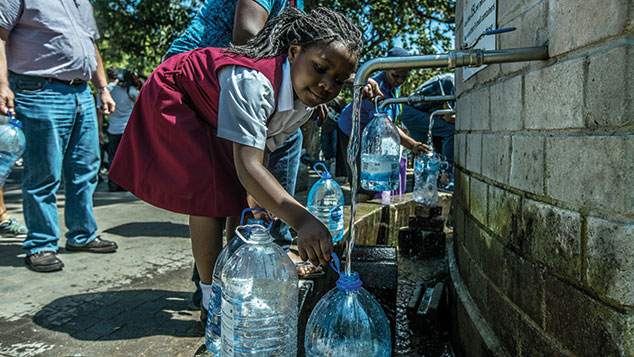
Cape Town, South Africa’s second-biggest city, might soon have to turn off the taps. What went wrong? And is this a sign of things to come for other cities? Simon Wilson reports.
What’s going on?
Cape Town, a metropolis of almost four million people – and the second-biggest city in Africa’s richest nation – may become the first major world city to run out of water. The Cape region is in the midst of a three-year drought, described by some researchers as a once-in-a-millennium event. Since 1 February, Capetonians have had to restrict daily usage to just 50 litres each – less than a third of average consumption in the UK. Water pressure has been cut; showers are infrequent and short; loos are seldom flushed. But it gets worse. The city’s six reservoirs are at record low levels (less than 25%). Within the next few months they are expected to fall to 13.5%, a critically low level in terms of physically being able to pump the water out.
What will happen?
At this point, which the authorities refer to apocalyptically as Day Zero, the piped supply will be deemed to have failed, and engineers will shut off water to about a million households, or 75% of the city. Instead, 200 water-collection points will be established around the city, and citizens will have to queue for an even lower daily ration of just 25 litres. There are fears of a public health crisis, grave damage to the already-suffering tourism and agriculture sectors, and even violence as people compete for the scarce resource. But Day Zero is not inevitable. Last weekend saw welcome rainfall. And since the harsh new restrictions were put in place this month, Capetonians have cut back on consumption.
When is Day Zero expected?
It’s been pushed back from mid-April to early May – a welcome sign that the city’s stark warnings are having an effect. But even if Day Zero doesn’t arrive soon, it will be a crisis postponed, not averted. As things stand, the authorities still fully expect to have to implement the emergency plan within months. Helen Zille, the premier of Western Cape Province, regards a shut-off as unavoidable. The real question, she says, is: “When Day Zero arrives, how do we make water accessible and prevent anarchy?”
How has this happened?
A massive expansion of the city over the past few decades, without the water infrastructure to support it, has left Cape Town exceptionally vulnerable to drought. Almost all the city’s water comes from six local dams that depend on rainfall. That’s a precarious situation in a dry region, which climatologists warn is only set to get drier, with rains becoming more unpredictable in coming decades, notes Piotr Wolski, a hydrologist at the University of Cape Town. The problem is that the current drought has arrived earlier than policymakers were expecting. Diversifying into new sources of water is part of Cape Town’s longer-term plans, says the deputy mayor, Ian Neilson – indeed, South Africa’s Department of Water Affairs warned the city that it needed to act as far back as 2007, citing fears that climate change would make its reliance on rainwater too risky – “but it was not envisaged that it would be required so soon”.
Why has the city failed to prepare?
Paradoxically, Cape Town is known for its strong environmental policies, including its careful water management. In 2014, the reservoirs were full. In 2015, the city was even awarded an “adaptation implementation” prize by the C40 group, a network of global cities focused on climate change. Although Cape Town’s population had boomed (up 79% since 1995), overall consumption has stayed flat since the early 2000s. In part, that was because many new arrivals settled in poor areas, which consume less water. Second, the city’s water conservation measures – fixing leaks and old pipes, installing meters and adjusting tariffs – had “a powerful impact. Maybe too powerful,” says Norimitsu Onishi in The New York Times. “The city conserved so much water that it postponed looking for new sources.”
What can the world learn from this?
That “the backwater of urban planning has become the front line in the fight against climate change”, reckons the Financial Times. And that investments that would have failed cost-benefit analyses ten years ago – such as costly desalination plants, in Cape Town’s case – now look essential. Part of the global response will require better co-ordination between national and municipal authorities (in Cape Town, animosity between the national ANC government and the Democratic Alliance that runs the province has hindered planning). There must also be a wholesale change of approach, with longer time horizons and an emphasis on resilience in the face of catastrophe. “Environmental change will place huge strains on many societies, and the risks of anarchy are real.”